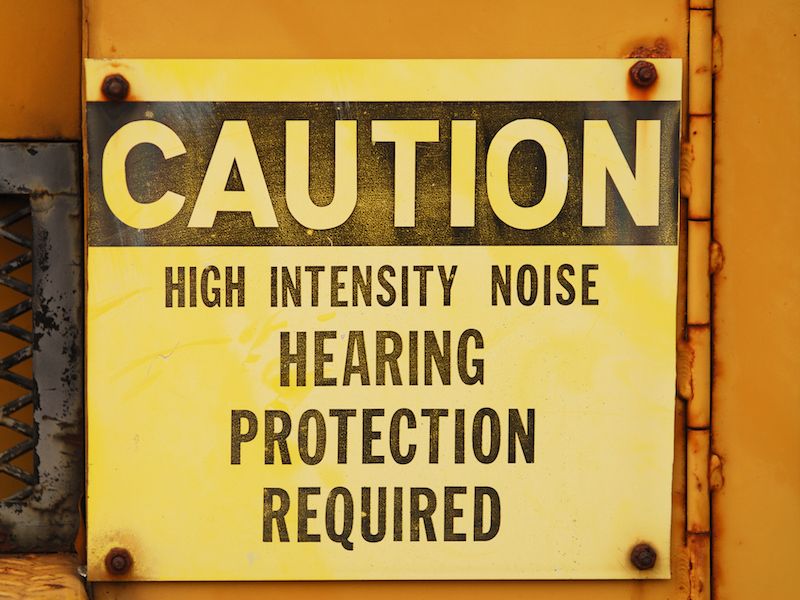
It’s one thing to recognize that you should protect your hearing. Recognizing when to safeguard your ears is another matter. It’s not as simple as, for example, knowing when to use sunscreen. (Is it sunny and are you going to be outdoors? Then you need sunscreen.) It isn’t even as easy as knowing when to use eye protection (Handling dangerous chemicals? Doing some construction? You need eye protection).
When it comes to when to use hearing protection, there seems to be a large grey area which can be dangerous. Frequently, we’ll defer to our natural inclination to avoid hearing protection unless we’re given information that a specific place or activity is dangerous.
A Tale of Risk Analysis
In general, we’re not very good at assessing risk, especially when it comes to something as intangible as lasting hearing problems or loss of hearing. To demonstrate the situation, here are some examples:
- Person A attends a very loud rock concert. The concert lasts around 3 hours.
- A landscaping company is run by person B. She spends a considerable amount of time mowing lawns, then goes home to a quiet house and reads a book.
- Person C is an office worker.
You may believe the hearing hazard is greater for person A (let’s just call her Ann). Ann leaves the performance with her ears ringing, and she’ll spend the majority of the next day, struggling to hear herself talk. Assuming Ann’s activity was hazardous to her ears would be sensible.
Person B (let’s call her Betty), on the other hand, is subjected to less noise. Her ears don’t ring. So it has to be safer for her hearing, right? Well, not really. Because Betty is mowing all day. So despite the fact that her ears never ring out with pain, the harm accrues gradually. If experienced on a regular basis, even moderately loud noises can have a detrimental affect on your ears.
Person C (let’s call her Chris) is even less obvious. Most people realize that you need to protect your hearing while using machines like a lawnmower. But even though Chris works in a quiet office, she has a very noisy, hour-long commute every day through the city. In addition, she sits at her desk and listens to music through earbuds. Does she need to give some thought to protection?
When You Should Think About Safeguarding Your Ears
The standard rule of thumb is that if you have to raise your voice in order to be heard, your surroundings are noisy enough to do injure to your ears. And if your surroundings are that noisy, you really should consider using earplugs or earmuffs.
The limit should be 85dB if you want to be scientific. Sounds above 85dB have the capacity, over time, to lead to damage, so you should consider wearing ear protection in those scenarios.
Your ears don’t have their own sound level meter to warn you when you get to that 85dB level, so countless hearing specialists recommend obtaining special apps for your phone. You will be capable of taking the necessary steps to safeguard your hearing because these apps will inform you when the sound is getting to a hazardous volume.
A Few Examples
Your phone might not be with you wherever you go even if you do get the app. So a few examples of when to protect your ears may help you establish a good standard. Here we go:
- Commuting and Driving: Spending all day as an Uber or Lyft driver? Or maybe you’re taking a subway after waiting for a little while downtown. The noise of living in a city is bad enough for your ears, not to mention the extra injury caused by turning up your tunes to drown out the city noise.
- Using Power Tools: You recognize that working every day at your factory job is going to call for hearing protection. But what if you’re simply working in your garage all day? Most hearing specialists will recommend you wear hearing protection when using power tools, even if it’s just on a hobbyist basis.
- Residential Chores: We already discussed how something as straightforward as mowing the lawn, when done often enough, can necessitate hearing protection. Chores, such as mowing, are probably something you don’t even think about, but they can lead to hearing impairment.
- Exercise: Your morning spin class is a good example. Or even your evening yoga session? You may think about wearing hearing protection to each. The high volume from trainers who use loud music and microphones for motivation, though it might be good for your heart rate, can be bad for your hearing.
- Listening to music with earbuds. This one requires caution, not protection. Give consideration to how loud the music is, how long you’re listening to it, and whether it’s playing directly into your ears. Consider getting headphones that cancel out outside noise so you don’t have to turn up the sound to dangerous levels.
A good baseline may be researched by these examples. When in doubt, however, you should choose protection. Compared to leaving your ears exposed to future harm, in most cases, it’s better to protect your hearing. If you want to be able to hear tomorrow, protect today.